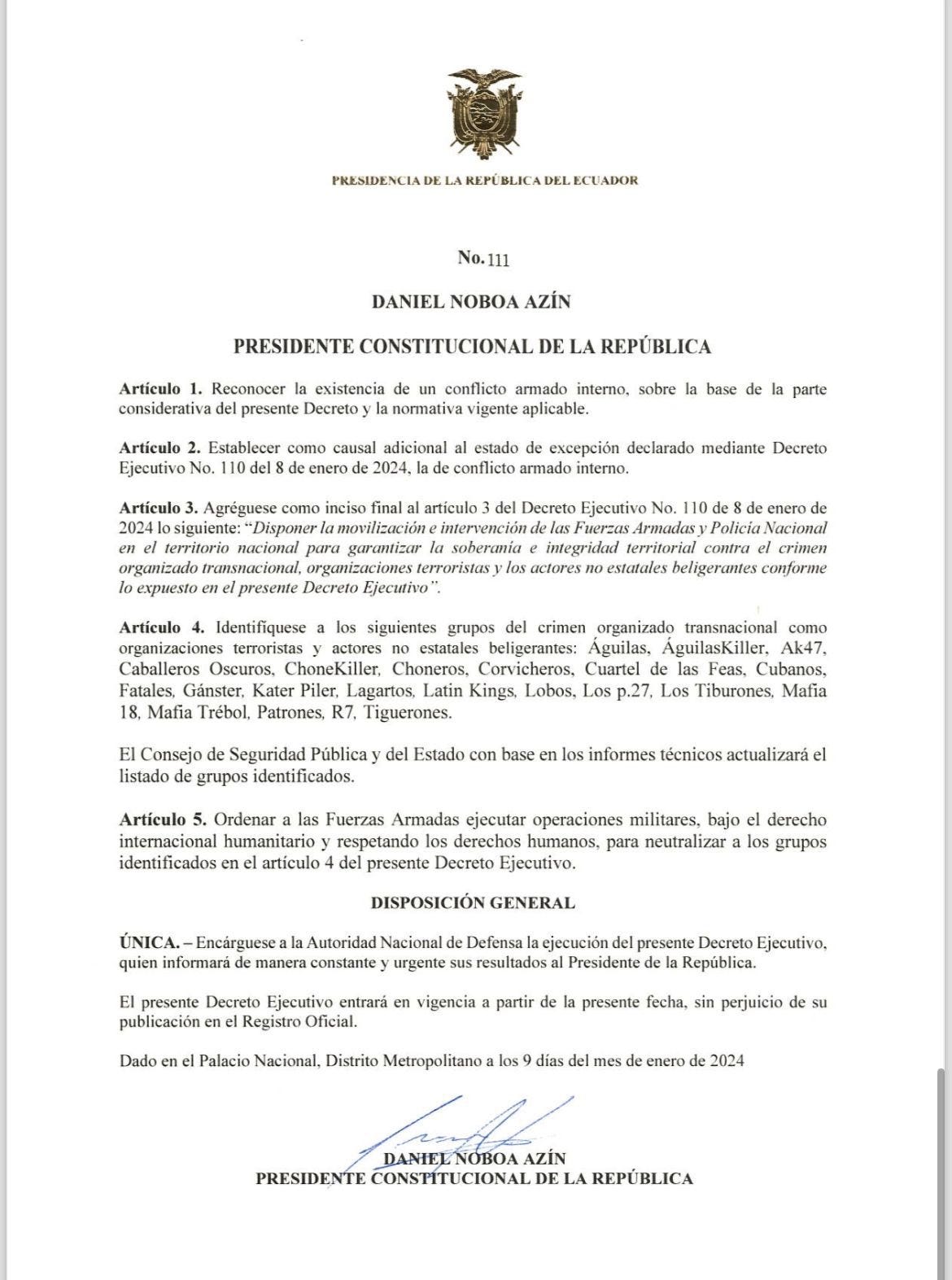Ecuador - Security crisis
The gangs are fighting each other and the government. Today's violence has been bad and the conditions exist for the situation to worsen.
Ecuador has begun the year with a security crisis. Even as I publish this on Tuesday, 9 January, various acts of violence have occurred including bombings in several cities, one targeting a top judicial official, and the armed takeover of a television station. Below is an attempt to organize my thoughts.
Two simultaneous fights are occurring in Ecuador to start 2024. The fights are violent and politicized.
Criminals vs the Government
Criminals vs Criminals
Many of the media articles from this past week portray the criminal vs government fight, particularly as two criminal leaders escaped the prison system.
Adolfo Macias, alias "Fito," is the leader of Los Choneros. He escaped right before a transfer to a more secure prison, suggesting inside help. The government has deployed soldiers specifically to find and recapture Macias. Macias is encouraging his group to commit acts of violence around the country to put pressure on the government to stop.
Fabricio Colón, alias "El Salvaje," led a local chapter of Los Lobos and had threatened Ecuadoran public officials in the past including Attorney General Diana Salazar. He was arrested last week but also escaped amid the prison chaos in recent days. He has had his fellow criminals post messages against the government and has openly stated he wants to target Salazar and Noboa.
While each of these two have a clear fight with the government, Los Choneros and Los Lobos are also fighting each other. A year ago, that fight was once mostly about drug trafficking routes and prison control. Now it's about politics, power, image, and influence. The side that can demonstrate it has the capacity to take on government forces and win will have leverage moving forward.
The groups are also engaging in a propaganda war against each other. Colón, for example, claims that Noboa has connections to Los Choneros and the escape of Macias demonstrates the president's alliance with the criminal group (there is no evidence for this).
This makes for a complicated situation that is much harder to analyze than if this was just about the government fighting a single criminal group. Because there are multiple criminal groups fighting each other as well as the government, any action the government takes against one criminal strengthens someone else. It's harder to deescalate the situation because this isn't just about two sides backing down. If the government backs down against one group, they risk attacks by another.
Noboa has staked his political future on the security situation.
The new president, in office for less than two months, is planning major security reforms and a referendum to get public buy-in for those reforms. That referendum was supposed to be an opportunity for the president to build on his election victory and keep momentum.
One challenge is that the criminal groups, which became far more politicized during the last election cycle, understand that the president's entire administration rests on his ability to improve security. It gives Los Choneros and Los Lobos leverage over the government. If they can use violence to turn the population against the government, they win. If they can force the government into concessions or negotiation, they win. And an armed military war against these criminal groups is far from simple and worsens the violence in the short term, which will weaken the government.
A second challenge is the fact the prison system is at the heart of the mess. To stop crime in any country, authorities must be able to investigate crimes, arrest criminals, prosecute and convict them, and then incarcerate them, with a system that can rehabilitate those who can eventually reenter society and hold those who cannot. When prison systems fail, they serve as recruitment, command and control centers for criminal groups. They can't hold the criminals. And when criminals can take hostages, the prisons become liabilities for the government.
When a government has no secure place to put the criminals they arrest, it builds the conditions under which human rights abuses occur. But fixing prisons is not something that can be done swiftly, especially when criminal groups are entrenched powers in those prisons and retaking control is the priority.
For the reasons above, expect violence to spread and worsen in the short term
Ecuador now faces a situation that has no quick solutions and many potential ways it can worsen. The criminal groups are incentivized to commit new acts of violence and the government must respond forcefully if it hopes to maintain any public support. Today's situation is particularly bad and some of the events that have occurred have been symbolically quite important, increasing the tension and giving both criminals and the government few options to move back down the ladder of escalation. More bombs and gun fights are likely and they are likely to spread to new areas of the country, not simply remain in the worst neighborhoods.
The criminals are looking for strategic targets because the violence they are committing has a political rather than an economic goal. That politicization, which started during the election and worsened over the past week, will make the situation more dangerous in the weeks to come.
UPDATE: Right as I published this, President Noboa announced that he is declaring the situation an “internal armed conflict” and ordering the military to go after a large number of gangs.

